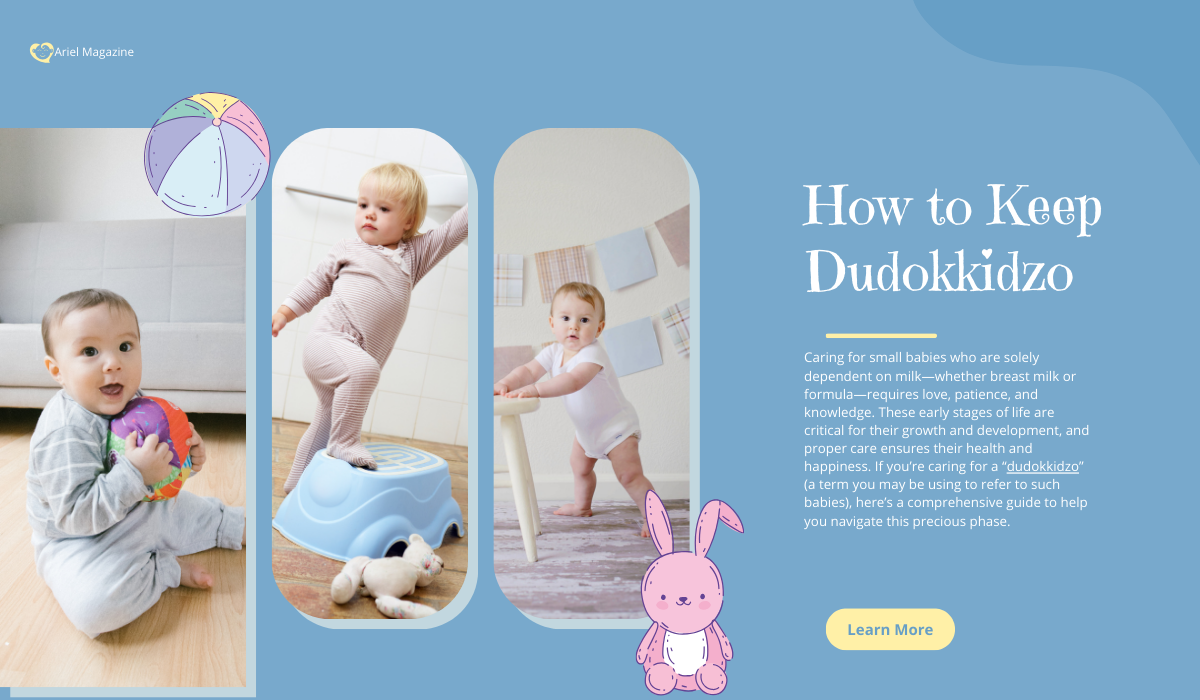Caring for small babies who are solely dependent on milk—whether breast milk or formula—requires love, patience, and knowledge. These early stages of life are critical for their growth and development, and proper care ensures their health and happiness. If you’re caring for a “dudokkidzo” (a term you may be using to refer to such babies), here’s a comprehensive guide to help you navigate this precious phase.
1. Feeding the Baby
Milk is the primary source of nutrition for newborns and milk-drinking infants. It’s essential to get feeding routines and techniques right.
- Breastfeeding:
- Breast milk is recommended as the best nutrition for infants.
- Feed on demand, which is usually every 2–3 hours, or when the baby shows hunger cues like sucking on their hands or rooting.
- Ensure a proper latch to avoid discomfort and ensure the baby gets enough milk.
- Formula Feeding:
- Choose a formula that meets your baby’s needs, and consult your pediatrician for recommendations.
- Prepare formula as per instructions, ensuring cleanliness to avoid contamination.
- Feed in small amounts regularly to mimic a natural feeding schedule.
- Burping After Feeding:
- Always burp the baby after feeding to release trapped air and prevent discomfort or spit-ups.
2. Maintaining Hygiene
Cleanliness is vital to protect milk-drinking babies from infections, as their immune systems are still developing.
- Feeding Equipment: Sterilize bottles, nipples, and other feeding tools after every use.
- Bathing: Gently bathe the baby 2–3 times a week with lukewarm water and mild baby soap. Keep the umbilical cord stump dry if it hasn’t fallen off yet.
- Diaper Care: Change diapers frequently to prevent rashes. Use baby wipes or cotton and warm water, and apply diaper cream as needed.
3. Creating a Safe Sleeping Environment
Sleep is crucial for newborns as it supports their growth and brain development.
- Sleep Position: Always place the baby on their back to reduce the risk of Sudden Infant Death Syndrome (SIDS).
- Crib Safety: Use a firm mattress with a fitted sheet, and avoid pillows, blankets, or stuffed toys in the crib.
- Room Temperature: Keep the room comfortably cool, around 68–72°F (20–22°C), to help the baby sleep peacefully.
4. Monitoring Health and Wellness
Milk-drinking babies are vulnerable to common issues like colic, gas, and minor infections. Regular monitoring can help address these quickly.
- Check Growth: Track weight gain and growth milestones to ensure the baby is thriving.
- Vaccinations: Stay on schedule with vaccines as per your pediatrician’s recommendations.
- Signs of Illness: Look for symptoms like fever, reduced feeding, or unusual crying, and seek medical help when needed.
5. Emotional Bonding
Babies need more than just physical care—they thrive on emotional connection and love.
- Skin-to-Skin Contact: Hold the baby close to provide warmth, comfort, and a sense of security.
- Talk and Sing: Speak to the baby in a soothing voice and sing lullabies to stimulate their hearing and bond with them.
- Respond to Cues: Pay attention to the baby’s cries and cues to understand their needs, whether they’re hungry, tired, or need comfort.
6. Staying Healthy as a Caregiver
Caring for a milk-drinking baby can be physically and emotionally demanding. Take care of yourself to provide the best care for your little one.
- Rest When the Baby Sleeps: Nap during the baby’s sleep times to stay rested.
- Stay Hydrated and Eat Well: Maintain a balanced diet, especially if breastfeeding, as it directly impacts milk production.
- Ask for Help: Don’t hesitate to seek support from family, friends, or professionals when needed.
Common Challenges and Solutions
- Spit-Ups: Keep the baby upright for 20–30 minutes after feeding to reduce spit-ups.
- Gas and Colic: Use gentle tummy massages or bicycle leg movements to relieve gas.
- Cluster Feeding: This is normal during growth spurts; feed as needed to meet the baby’s increased demands.
Conclusion
Caring for milk-drinking babies requires attentiveness, nurturing, and patience. By focusing on feeding, hygiene, sleep, health, and emotional bonding, you can ensure that your little one grows healthy and happy. Remember, every baby is unique, so adapt to their needs while seeking support when necessary.
This phase, though challenging, is also deeply rewarding, as you lay the foundation for a lifetime of growth and development.
